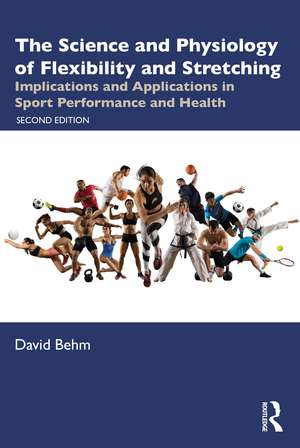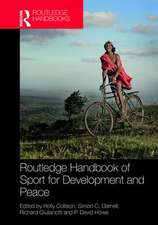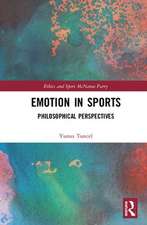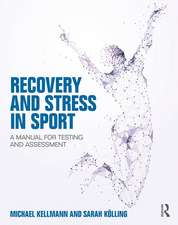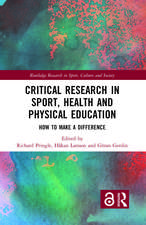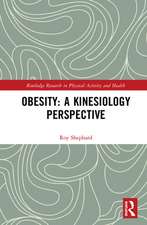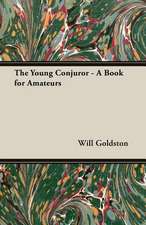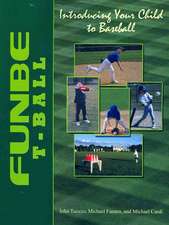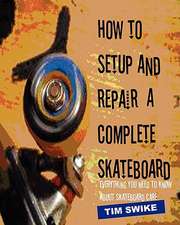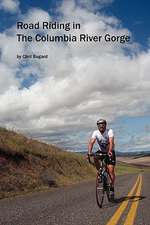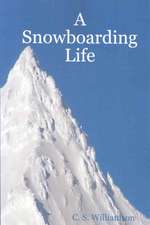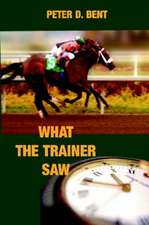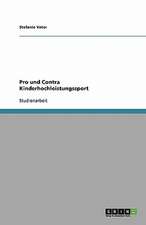The Science and Physiology of Flexibility and Stretching: Implications and Applications in Sport Performance and Health
Autor David Behmen Limba Engleză Paperback – 30 oct 2024
Richly illustrated, and including an online resource, The Science and Physiology of Flexibility and Stretching provides an important scientific inquiry into stretching as well as other flexibility enhancing techniques (e.g., foam rolling, vibration, resistance training, and others) and an invaluable reference for any strength and conditioning coach or student, personal trainer, sports coach, or exercise scientist.
| Toate formatele și edițiile | Preț | Express |
|---|---|---|
| Paperback (2) | 280.67 lei 22-36 zile | +20.42 lei 6-12 zile |
| Taylor & Francis – 30 oct 2024 | 280.67 lei 22-36 zile | +20.42 lei 6-12 zile |
| Taylor & Francis – 9 noi 2018 | 348.55 lei 22-36 zile | |
| Hardback (2) | 1004.24 lei 43-57 zile | |
| Taylor & Francis – 7 noi 2018 | 1159.61 lei 22-36 zile | |
| Taylor & Francis – 30 oct 2024 | 1004.24 lei 43-57 zile |
Preț: 280.67 lei
Nou
Puncte Express: 421
Preț estimativ în valută:
53.71€ • 56.22$ • 44.70£
53.71€ • 56.22$ • 44.70£
Carte disponibilă
Livrare economică 10-24 martie
Livrare express 22-28 februarie pentru 30.41 lei
Preluare comenzi: 021 569.72.76
Specificații
ISBN-13: 9781032709079
ISBN-10: 1032709073
Pagini: 280
Ilustrații: 254
Dimensiuni: 156 x 234 x 20 mm
Greutate: 0.4 kg
Ediția:2
Editura: Taylor & Francis
Colecția Routledge
Locul publicării:Oxford, United Kingdom
ISBN-10: 1032709073
Pagini: 280
Ilustrații: 254
Dimensiuni: 156 x 234 x 20 mm
Greutate: 0.4 kg
Ediția:2
Editura: Taylor & Francis
Colecția Routledge
Locul publicării:Oxford, United Kingdom
Public țintă
Academic, General, Postgraduate, and Undergraduate AdvancedCuprins
Section I: The Science and Physiology of Stretching
1. My Personal Motivation for Stretching
2. History of Stretching
3. Types of Stretching and the Effects on Flexibility
Stretching-Induced Changes in Range of Motion (ROM)
Yoga
Range of Motion (ROM) Norms
Measuring Range of Motion (ROM)
Sex Differences
Ageing Differences
Youth Differences
Genetic Differences
Limb Dominance Differences
Circadian (Diurnal: time of day) Differences
Summary
4. Mechanisms Underlying Acute Changes in Range of Motion (ROM)
Thixotropic Effects
Neural Mechanisms of Acute Static Stretching
Neural Mechanisms of Acute Proprioceptive Neuromuscular Facilitation (PNF) Stretching
Neural Mechanisms of Acute Dynamic Stretching
Stretch Tolerance Sensory Theory
Acute Morphological Static Stretching Mechanisms
Skeletal Structures
Ligaments
Adiposity
Nerves
Muscle Hypertrophy
Intracellular and Extracellular Connective Tissue
Tendons
Fascicles
Acute Morphological Proprioceptive Neuromuscular Facilitation (PNF) Stretching Mechanisms
Acute Morphological Dynamic Stretching Mechanisms
Summary
5. Stretch Training-related Range of Motion (ROM) Changes and Mechanisms
Plastic Neural Adaptations
Plastic Morphological Adaptations
Psychological Adaptations
Summary
6. Global Effects of Stretching
Crossover or non-local muscle fatigue
Global Stretching Effects on Range of Motion (ROM)
Global Stretching Effects on Performance
Mechanisms Underlying Global Stretching Effects
Global Effects of Foam Rolling
Summary
7. Recommendations for Stretch prescription
Stretching Duration
Stretching Intensity
Optimal Time of Day to Stretch
Stretching Frequency (Days/week)
Pre- versus post-workout stretching
Stretching for Relaxation
Ventilatory Effects on Stretching
Combining Stretching with Muscular Contractions or Massage
Effect of Temperature on Stretching
Stretching under Metastable Conditions
Summary
8. Stretching Effects on Injury Reduction and Health
Physiological Rationale for Stretch-induced Injury Reduction
Dynamic Stretching and Activity Effects on Injury Incidence
Stretching Effects on Posture, Low Back Pain and Compensatory Overuse Syndromes
Effects of Immobilization on Flexibility
Stretching Effects on Dysmenorrhea
Stretching Effects on the Cardiovascular System
Summary
9. Does Stretching Affect Performance?
Static and PNF Stretching
Effects of Static Stretching on the Stretch-Shortening Cycle
Stretching Effects on Balance
Effects of Flexibility Training
Ageing Effects
Effect of Stretching Intensity
Cost Benefit Analysis
Effects of Dynamic Stretching on Performance
Effects of Combining Static and Dynamic Stretching on Performance
Effects of Ballistic Stretching on Performance
Full Warm-ups
Limitations of Acute Stretching Studies
Improving Performance by Limiting Muscle Soreness
Summary
10. Effect of Stretch Training on Functional Performance
Static Stretching
Dynamic Stretch Training
Summary
Chapter 11: Effects of Stretch Training on Muscle Strength and Hypertrophy
Author: Konstantin Warneke
What humans can learn from chicken and quails
Does stretching provide a sufficient stimulus to enhance human muscle strength and size?
Underlying mechanisms of stretch-mediated hypertrophy and strength increases
Practical applications and limitations
Section II: The Science and Physiology of Alternative Techniques for Increasing Range of Motion
12: Effects of Resistance Training on Range of Motion (ROM)
Author: Shahab Alizadeh
Moderating Variables
Possible Mechanisms
Summary
13. Acute and Chronic Effects of Foam Rolling Effects on Range of Motion (ROM)
and Performance
Author: Andreas Konrad
Fascial Restrictions and Myofascial Adhesions
Type of foam rollers
Acute foam rolling effects
Chronic foam rolling effects
Rolling Mechanisms
Other potential benefits or contradictors
Rolling Recommendations
Summary
14. Local Vibration Effects on Range of Motion (ROM) and Performance
Effects on Range of Motion (ROM)
Effects on Performance
Mechanisms
Summary
15. Instrument Assisted Soft Tissue Mobilization (IASTM)- no figure call outs
Acute Effects on Range of Motion (ROM)
Training Effects on Range of Motion (ROM)
Global effects of IASTM
IASTM Effects on Performance
Mechanisms
Summary
16. Flossing Effects on Range of Motion (ROM) and Performance
Floss Band Effects on ROM
Flossing Effects on Performance
Mechanisms
Flossing Effects on Pain
Summary
17. Stretching Exercise Illustrations
1. My Personal Motivation for Stretching
2. History of Stretching
3. Types of Stretching and the Effects on Flexibility
Stretching-Induced Changes in Range of Motion (ROM)
Yoga
Range of Motion (ROM) Norms
Measuring Range of Motion (ROM)
Sex Differences
Ageing Differences
Youth Differences
Genetic Differences
Limb Dominance Differences
Circadian (Diurnal: time of day) Differences
Summary
4. Mechanisms Underlying Acute Changes in Range of Motion (ROM)
Thixotropic Effects
Neural Mechanisms of Acute Static Stretching
Neural Mechanisms of Acute Proprioceptive Neuromuscular Facilitation (PNF) Stretching
Neural Mechanisms of Acute Dynamic Stretching
Stretch Tolerance Sensory Theory
Acute Morphological Static Stretching Mechanisms
Skeletal Structures
Ligaments
Adiposity
Nerves
Muscle Hypertrophy
Intracellular and Extracellular Connective Tissue
Tendons
Fascicles
Acute Morphological Proprioceptive Neuromuscular Facilitation (PNF) Stretching Mechanisms
Acute Morphological Dynamic Stretching Mechanisms
Summary
5. Stretch Training-related Range of Motion (ROM) Changes and Mechanisms
Plastic Neural Adaptations
Plastic Morphological Adaptations
Psychological Adaptations
Summary
6. Global Effects of Stretching
Crossover or non-local muscle fatigue
Global Stretching Effects on Range of Motion (ROM)
Global Stretching Effects on Performance
Mechanisms Underlying Global Stretching Effects
Global Effects of Foam Rolling
Summary
7. Recommendations for Stretch prescription
Stretching Duration
Stretching Intensity
Optimal Time of Day to Stretch
Stretching Frequency (Days/week)
Pre- versus post-workout stretching
Stretching for Relaxation
Ventilatory Effects on Stretching
Combining Stretching with Muscular Contractions or Massage
Effect of Temperature on Stretching
Stretching under Metastable Conditions
Summary
8. Stretching Effects on Injury Reduction and Health
Physiological Rationale for Stretch-induced Injury Reduction
Dynamic Stretching and Activity Effects on Injury Incidence
Stretching Effects on Posture, Low Back Pain and Compensatory Overuse Syndromes
Effects of Immobilization on Flexibility
Stretching Effects on Dysmenorrhea
Stretching Effects on the Cardiovascular System
Summary
9. Does Stretching Affect Performance?
Static and PNF Stretching
Effects of Static Stretching on the Stretch-Shortening Cycle
Stretching Effects on Balance
Effects of Flexibility Training
Ageing Effects
Effect of Stretching Intensity
Cost Benefit Analysis
Effects of Dynamic Stretching on Performance
Effects of Combining Static and Dynamic Stretching on Performance
Effects of Ballistic Stretching on Performance
Full Warm-ups
Limitations of Acute Stretching Studies
Improving Performance by Limiting Muscle Soreness
Summary
10. Effect of Stretch Training on Functional Performance
Static Stretching
Dynamic Stretch Training
Summary
Chapter 11: Effects of Stretch Training on Muscle Strength and Hypertrophy
Author: Konstantin Warneke
What humans can learn from chicken and quails
Does stretching provide a sufficient stimulus to enhance human muscle strength and size?
Underlying mechanisms of stretch-mediated hypertrophy and strength increases
Practical applications and limitations
Section II: The Science and Physiology of Alternative Techniques for Increasing Range of Motion
12: Effects of Resistance Training on Range of Motion (ROM)
Author: Shahab Alizadeh
Moderating Variables
Possible Mechanisms
Summary
13. Acute and Chronic Effects of Foam Rolling Effects on Range of Motion (ROM)
and Performance
Author: Andreas Konrad
Fascial Restrictions and Myofascial Adhesions
Type of foam rollers
Acute foam rolling effects
Chronic foam rolling effects
Rolling Mechanisms
Other potential benefits or contradictors
Rolling Recommendations
Summary
14. Local Vibration Effects on Range of Motion (ROM) and Performance
Effects on Range of Motion (ROM)
Effects on Performance
Mechanisms
Summary
15. Instrument Assisted Soft Tissue Mobilization (IASTM)- no figure call outs
Acute Effects on Range of Motion (ROM)
Training Effects on Range of Motion (ROM)
Global effects of IASTM
IASTM Effects on Performance
Mechanisms
Summary
16. Flossing Effects on Range of Motion (ROM) and Performance
Floss Band Effects on ROM
Flossing Effects on Performance
Mechanisms
Flossing Effects on Pain
Summary
17. Stretching Exercise Illustrations
Recenzii
"In this comprehensive textbook, readers will discover a wealth of stretching techniques designed to improve flexibility, sport performance, prevent injuries, and promote overall health. Whether you are an athlete looking to enhance performance or simply aiming to increase your range of motion, Professor Behm’s textbook is a must-have addition to your fitness library."
Prof. Urs Granacher, PhD, University of Freiburg, Germany.
"Professor Behm shares his profound knowledge and expertise in this book. The body of available evidence is presented using an explicative and practical narrative. An essential read for all those interested in the topic."
Prof. Rodrigo Ramirez-Campillo PhD, Exercise and Rehabilitation Sciences Institute. School of Physical Therapy. Faculty of Rehabilitation Sciences. Universidad Andres Bello. Santiago, Chile.
"It is the perfect book to tap into the wisdom of stretching as developed by researchers. By reading this book, you will gain wisdom about the past, present, and imagine the future of stretching"
Prof. Masatoshi Nakamura PhD,Faculty of Rehabilitation Sciences, Nishi Kyushu University, Kanzaki, Saga, Japan
"With this work, Prof. Behm provides an encyclopedia of flexibility techniques that illustrates the current scientific knowledge on stretching and related training techniques in the most comprehensive manner. The content of this book served as an important baseline for much ongoing research, including my PhD Thesis."
Konstantin Warneke PhD, University of Graz, Graz Austria
Prof. Urs Granacher, PhD, University of Freiburg, Germany.
"Professor Behm shares his profound knowledge and expertise in this book. The body of available evidence is presented using an explicative and practical narrative. An essential read for all those interested in the topic."
Prof. Rodrigo Ramirez-Campillo PhD, Exercise and Rehabilitation Sciences Institute. School of Physical Therapy. Faculty of Rehabilitation Sciences. Universidad Andres Bello. Santiago, Chile.
"It is the perfect book to tap into the wisdom of stretching as developed by researchers. By reading this book, you will gain wisdom about the past, present, and imagine the future of stretching"
Prof. Masatoshi Nakamura PhD,Faculty of Rehabilitation Sciences, Nishi Kyushu University, Kanzaki, Saga, Japan
"With this work, Prof. Behm provides an encyclopedia of flexibility techniques that illustrates the current scientific knowledge on stretching and related training techniques in the most comprehensive manner. The content of this book served as an important baseline for much ongoing research, including my PhD Thesis."
Konstantin Warneke PhD, University of Graz, Graz Austria
Notă biografică
David Behm is a University Research Professor at Memorial University of Newfoundland. He was a highly competitive athlete, excelling in baseball, ice hockey, and was drafted into the Canadian Football League (1979). His athletic background led him to seek out an academic career in the areas of applied neuromuscular physiology and sport/exercise science. Dr. Behm has won a number of university, national, and international awards based on his internationally recognized research contributions. At the time of publication, he has published over 20 book chapters, over 400 peer-reviewed scientific articles with over 35,000 citations. He consistently presents his research findings internationally and his work is often featured in popular fitness and health magazines and online publications.
Descriere
The Science and Physiology of Flexibility and Stretching is the most up-to-date and comprehensive book to cover the underlying physiology and psychology of flexibility enhancing techniques, assessing why, when, and how we should stretch, as well as offering a highly illustrated, practical guide to stretching exercises.
